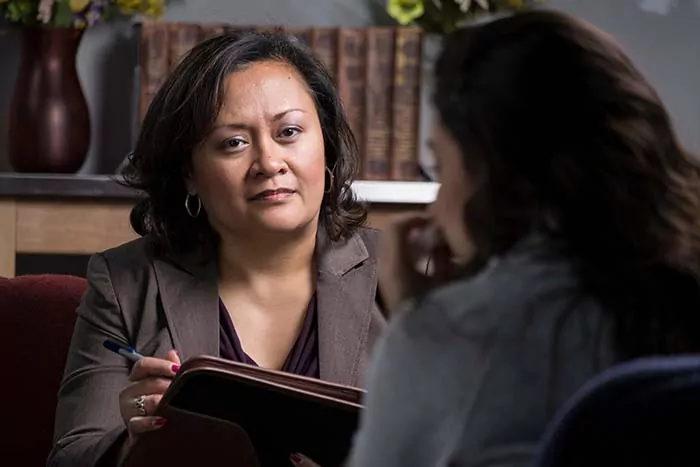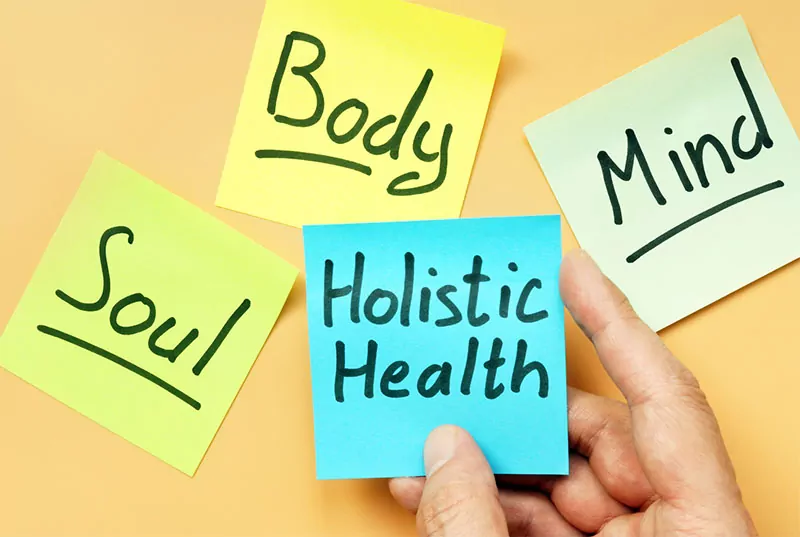Whole Person Care recognizes that a person is more than just their physical body. It’s about treating someone’s physical, social, emotional, and mental needs as a whole. This approach has never been more important. According to the CDC, over 76% of Americans live with at least one chronic condition like heart disease or diabetes, and more than half have two or more. These conditions affect not just physical health, but every aspect of a person’s life. That’s why Whole Person Care is becoming essential in modern healthcare. At Eleanor Health, we’ve made this approach the foundation of how we help our members live healthier, fuller lives. In this blog, we’ll show you how Whole Person Care works and why it makes a difference.

At Eleanor Health, we know that effective treatment means looking at the whole picture of a person’s health. That’s why we’ve developed a four-prong approach that works together to support lasting recovery and wellness:
1. Physical Health Support. We help you take care of your body through:
2. Psychological Care. Our mental health experts provide:
3. Social Support. We help you build a strong foundation for recovery through:
4. Mental Wellness. We offer tools to strengthen your recovery journey:
Each of these components works together to give you the best chance at lasting recovery and improved health.
Great healthcare takes teamwork. At Eleanor Health, we bring together different specialists who work as one team to support your health journey. Here’s who makes up your care team:
Your Primary Care Provider. Think of them as the captain of your healthcare team. They:
Mental Health Providers. Our behavioral health experts help you with:
Support Services Team. These team members help with practical needs like:
Medical Specialists. This includes professionals who focus on specific aspects of your health:
Every member of your care team works together, sharing information and coordinating your care. This team approach means you get comprehensive support for all aspects of your health, including physical, mental, and social. Plus, we make sure your insurance works with our care plan, so you can focus on getting better.

Research shows that treating the whole person, rather than just individual symptoms, leads to better health outcomes. Here’s how whole-person care makes a difference:
Better Health Outcomes
Stronger Patient-Provider Relationships
More Efficient Healthcare
Comprehensive Support
This approach is especially helpful if you’re dealing with:
When healthcare providers look at the whole picture, you’re more likely to achieve lasting improvements in your health and quality of life.
When Eleanor Health opened in 2019, we saw a critical gap in addiction treatment. Many people weren’t getting the comprehensive care they needed. That’s why we created a different kind of healthcare experience—one that treats the whole person, not just their addiction.
Our approach works because we:
Our experience shows that successful treatment needs to address both addiction and other health challenges. That’s why we offer:
Complete Medical Care
Mental Health Support
Practical Help for Real Life
We believe that getting better shouldn’t be complicated. That’s why we coordinate all these services for you, so you can focus on your recovery.
If you’re ready to get started with a compassionate care team that wants to help improve your specific health needs while simplifying the process, Eleanor Health is here to help. Reach out today to get started!

What is holistic health?
Holistic health is a comprehensive approach to wellness that looks beyond just physical symptoms to consider every aspect of a person’s wellbeing. This includes physical health, mental wellness, emotional balance, social connections, and overall quality of life. At Eleanor Health, we understand that these elements are deeply interconnected. For example, stress can affect physical health, while physical discomfort can impact mental wellness. Our holistic health approach combines evidence-based medical care with lifestyle support, mental health services, and social assistance to create a complete picture of wellness. Rather than treating isolated symptoms, we work to understand and improve all the factors that influence your health, helping you achieve lasting positive changes in your overall well-being.
How is holistic care different from whole person care?
While both approaches share a commitment to comprehensive care, they differ in important ways. Holistic care embraces a broader range of healing practices, including alternative and complementary therapies, with an emphasis on the mind-body-spirit connection. At Eleanor Health, our whole person care model takes the best of this holistic philosophy and integrates it with evidence-based medical practices within our healthcare system. We focus on coordinated, team-based care that combines conventional medical treatments with supportive services like mental health care, social support, and lifestyle guidance. This integrated approach ensures you receive scientifically-proven treatments while still addressing all aspects of your health and wellness. Think of whole person care as the practical application of holistic principles within a modern medical framework, designed to give you the most effective combination of treatments and support.
How does whole person care address chronic diseases and immune system health?
At Eleanor Health, we understand that chronic diseases and immune health require a comprehensive treatment strategy. Our whole-person approach recognizes that these health challenges affect every aspect of your life and often interact with each other. Through our integrated care model, we help strengthen your immune system and manage chronic conditions by combining medical treatment with lifestyle optimization. This includes personalized medication management, regular health monitoring, and evidence-based lifestyle modifications like stress reduction techniques, nutrition guidance, and exercise planning. Our care team works together to address both the direct symptoms of chronic conditions and their broader impact on your mental health, daily activities, and overall quality of life. We’ve found that this comprehensive approach not only helps manage existing conditions but also supports your body’s natural defense systems, leading to better long-term health outcomes and improved overall wellness.
What holistic and complementary therapies does Eleanor Health offer?
Our approach combines traditional medical care with evidence-based holistic therapies to support your complete recovery journey. We offer a range of complementary treatments that work alongside conventional medicine, including mindfulness practices, stress management techniques, and therapeutic movement activities like yoga. These therapies are carefully selected to complement your medical treatment plan and are provided by trained professionals who understand both traditional and holistic approaches to healing. We may incorporate breathing exercises, meditation, progressive muscle relaxation, and other mind-body techniques that have been proven to enhance recovery outcomes. Each therapy is chosen based on your specific needs, health goals, and treatment progress, ensuring that every element of your care plan works together to support your overall wellness.
What personalized recommendations and health screenings do patients receive?
At Eleanor Health, every patient receives a comprehensive initial assessment that forms the foundation of their personalized care plan. Our health screenings include thorough physical health evaluations, mental health assessments, and detailed reviews of lifestyle factors that may impact your well-being. Based on these assessments, our care team develops individualized recommendations that may include medication management, therapy options, lifestyle modifications, and preventive care strategies. We regularly update these recommendations as your health needs change, using ongoing screenings and check-ins to track your progress. Our team also provides specialized screenings for specific health concerns, such as chronic disease monitoring, substance use assessments, and mental health evaluations. This systematic yet personalized approach ensures you receive the right care at the right time, always tailored to your unique health journey.
If you’re ready to get started with a compassionate care team that wants to help improve your specific health needs while simplifying the process, Eleanor Health is here to help. Reach out today to get started!
 10 Best Apps for Mental Health
10 Best Apps for Mental Health
 What is Holistic Health?
What is Holistic Health?
 Benefits of Exercise on Mental Health
Benefits of Exercise on Mental Health